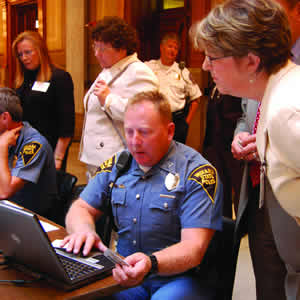 Since July 1 of this year, five Indiana law enforcement officers have piloted a new electronic citation and warning system for traffic violations. This represented the first step of an exciting project spearheaded by the Indiana Supreme Court and its Judicial Technology and Automation Committee, through the Division of State Court Administration. The project is a piece of the Court’s integrated technology strategy for Indiana’s courts and will serve as the front end of an electronic “start for finish” traffic ticket process. Funding for the project came from the U.S. Department of Transportation – Federal Motor Carrier Safety Administration.
Since July 1 of this year, five Indiana law enforcement officers have piloted a new electronic citation and warning system for traffic violations. This represented the first step of an exciting project spearheaded by the Indiana Supreme Court and its Judicial Technology and Automation Committee, through the Division of State Court Administration. The project is a piece of the Court’s integrated technology strategy for Indiana’s courts and will serve as the front end of an electronic “start for finish” traffic ticket process. Funding for the project came from the U.S. Department of Transportation – Federal Motor Carrier Safety Administration.
In 2007, the legislature tasked the Supreme Court Division of State Court Administration with the responsibility of designing a uniform electronic traffic citation for use in Indiana. This enabled the Supreme Court to develop a seamless e-citation process allowing tickets to be issued, filed in a court, disposed and transmitted to the Bureau of Motor Vehicles entirely electronically.
State and local police officers using eCWS have already issued more than 1,000 citations and warnings, and provided valuable feedback and suggestions to JTAC. Statewide training for Indiana State Police (ISP) officers is now underway. Training for Indiana State Police officers and those in the Commercial Vehicle Enforcement Division – more than 1,000 officers – will be completed by the end of this year and the system will be in use statewide.
At a press event on August 31 announcing the eCWS pilot, ISP Superintendent Paul Whitesell noted that officers using JTAC’s electronic ticketing system have increased safety and efficiency because the time spent on a roadside traffic stop is cut almost in half. While the elimination of old fashioned paper ticket books will save law enforcement officers time as well as money, the eCWS project will bear even more significant benefit for courts and clerks when it is completed in 2008.
All of the tickets being created through eCWS will be transmitted to a central repository, creating a database where all the documents are easily searchable and readily available. And, looking a few steps ahead, the tickets being created electronically will eventually be sent to the new Odyssey Case Management System being deployed by the Supreme Court. This means that the ticket produced on the roadside will be transmitted to Odyssey where the information on the driver and the infraction will become a court record and assigned a case number.
The ability to have these seamless interfaces and reduce duplicate data entry and the chance for data errors is what makes this technology so exciting. Courts will receive the information they need in a fraction of the time with enhanced accuracy. The timesaving eCWS provides is noteworthy when you consider more than 700,000 traffic citations are filed in Indiana every year. And, best of all: the e-CWS application is available at no cost.
 Many partners helped create eCWS with their invaluable input, cooperation and funding, including:
Many partners helped create eCWS with their invaluable input, cooperation and funding, including:
- Ind. Bureau of Motor Vehicles
- Ind. Criminal Justice Institute
- Ind. State Police
- U.S. Dept. of Transportation – Federal Motor Carrier Safety Admin.
- National Highway Safety Admin.
- Ind. Dept. of Homeland Security
- Ind. Association of Chiefs of Police
- Indiana Sheriffs’ Association
- Ind. Dept. of Natural Resources
- Indiana State Excise Police
How eCWS works
Officer uses hand-held scanner to read bar code on license and registration.
Information (name, address, car model, etc.) is instantly added to the ticket.
The front of the drivers’ license is scanned so a picture of the license, including the photo, is added to the database to ensure there is no mistaken identity.
Citation is generated with all offenses (up to four on one ticket) and court information.
Officer prints paper ticket for offender and court unless tickets can be filed electronically.
At the end of a shift or other appropriate time, officer transmits offenses to central repository.
Ticket data is sent to local court where a case is generated.
In counties using the state Odyssey case management system (CMS), the case information will be automatically entered in the CMS.
Although developed and facilitated by the Supreme Court the traffic citation information retains its status as law enforcement information until it is transmitted to and filed with a court.